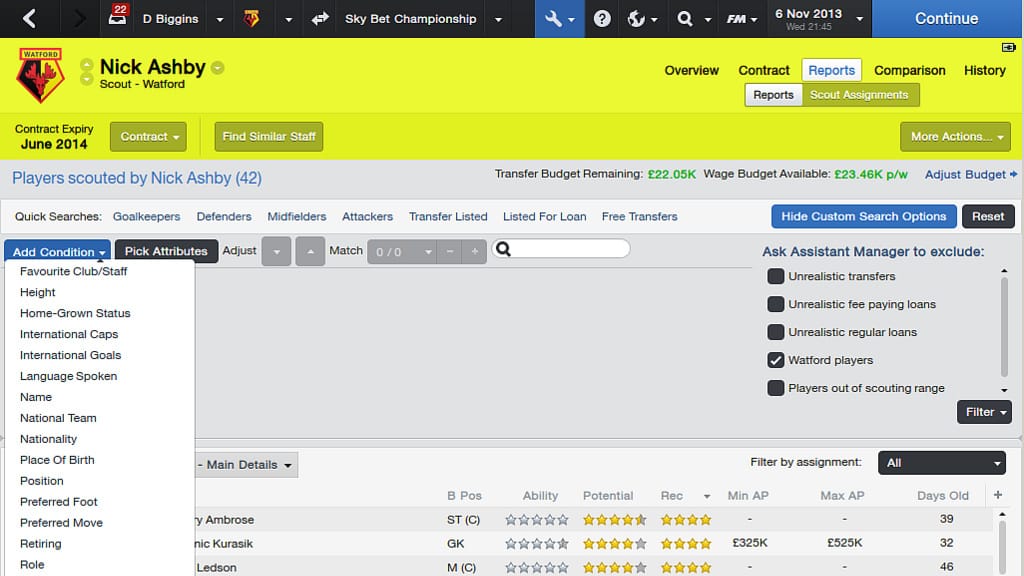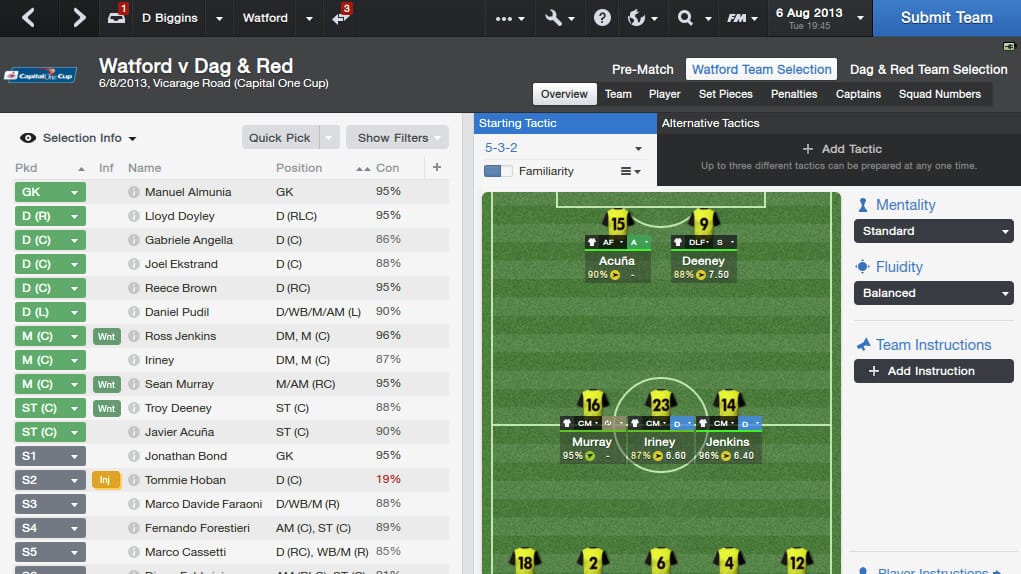A non-comprehensive overview of things that Football Manager 2014 is

Author’s note: Throughout this article, “football” will refer to the sport known to Americans as “soccer.” This is my European prerogative.
Football Manager 2014 is the only football management game I have ever played, so diving in, I expected anything. I found almost everything.
Football Manager is a great many things.
Football Manager is a tactics game, wherein you guide a team of 11 AI-controlled footballers, giving them positions on the field, roles to fulfill and a detailed set of instructions. There’s a scary amount of granularity, but the rewards are real—watching your team suddenly click into place because you understood the subtle difference between a “regista” and a “deep-lying playmaker” is a source of that fantastic sense of mastery and awe that only a system-driven game can give.
There’s a scary amount of granularity, but the rewards are real
Football Manager is a game of numbers. Contained in its code lies the world’s largest database of real-world footballers, with every one of it’s 137,000 players modelled with numbers in 37 different statistics, and every one of them made to represent a real-world footballer. The developers claim on their website to employ “more than 1000 researchers across the world” gathering information on professional and semi-professional leagues, making sure that the virtual players are true to their real-world counterparts. Its use transcends gaming—several high-profile teams use the game to scout out promising new players in the real world, and in 2008, Everton FC—a British Premier League football club—signed an exclusive deal to get access to the database before anyone else, making sure that they got ahead of the other teams that also use Football Manager for scouting purposes.

Football Manager is a simulation of football, where two teams of artificial intelligences try their best to put your vague instructions into practice—all the while running, passing, making poor decisions, being stubborn, being creative and scoring goals. The simulation is presented by default as a fully three-dimensional TV-presentation, which is just realistic enough to be uncanny. Thankfully, there is a more elegant alternative—a top-down, two-dimensional field with players shown as numbered dots. Here, the presentation becomes just abstract enough to seem real, and it lets you see the beauty of the game more clearly.
Football Manager is a game with choose-your-own-adventure board-meetings.
Its beauty goes beyond numbers.
Football Manager is a lesson in the beauty of football. It demands that you learn some fundamental lessons about the game—that, unlike most other popular team sports, Football has no clear distinction between attack and defense; that this fluidity means that the majority of the game takes place in the midfield where the two teams jockey for position and try to outmaneuver one another; and that every player’s role is vague and that a small change in attitude on one side of the pitch can make a big difference on the other. It also tells us of the beauty of simulations, and since the game gives the AI players room to express individuality, it shows you how the individual strengths and weaknesses of players influence a fluid dance of 22 strong men on a field of grass. Its beauty goes beyond numbers.
Football Manager is, according to the developers, made at a studio where “there is no one […] with the specific job title of ‘designer.’” It has the more-is-more sensibilities of Dwarf Fortress—it’s hulking, nothing is left out and everything is simulated.
Football Manager is a game where you can be fired.

Football Manager is a game of imperfect information, where access to the game’s database is granted only through a team of virtual scouts—a group of individuals that have stats and affinities of their own, determining how reliable your information will be. Nothing is certain, no information is clear, and there is always good reason to screw logic and go with your gut.
Football Manager is a game where you can tell your players how disappointed you are with their performance assertively, aggressively, cautiously, reluctantly, calmly or passionately.
Nothing is certain, no information is clear, and there is always good reason to screw logic and go with your gut.
Football Manager is a strategy game, where you form a team around constraints in budget and skills, trying to pick players that will complement your team strategy, and then form that strategy, responding to situations thrown at you from the game’s systems. A key defensive player twists an ankle, and your goalkeeper gets called up to play on the Hungarian national team, and you have an interesting challenge ahead of you. It’s a game where you have to balance long-term goals against short-term benefits, how much money to put into signing promising 16-year olds versus getting that soon-to-be-obsolete 32 year old midfielder you really need right now, how hard you should push your team in training versus resting for the next game. There is always at least one interesting system that requires your attention. Often there are five.
Football Manager 2014 is probably only a marginal improvement over Football Manager 2013. I wouldn’t know.
It’s probably even better if you are already a fan of football heading into the experience. Again, I wouldn’t know.
Header image courtesy A. Ahmadi



